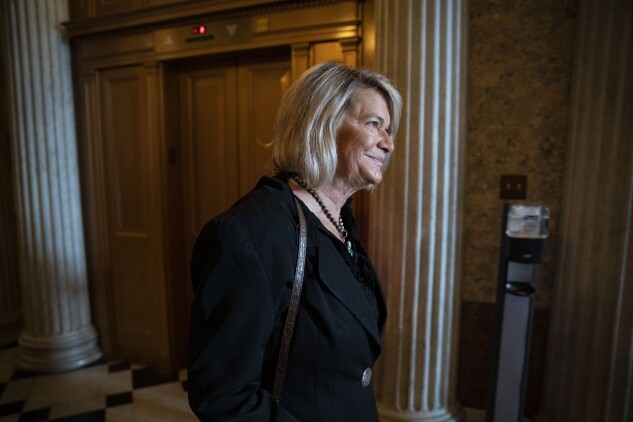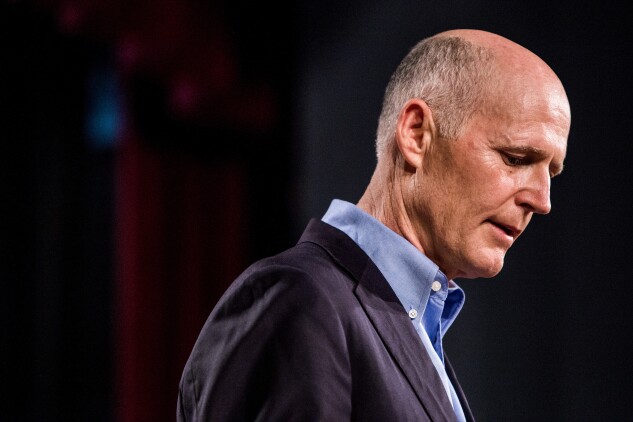Another priority vote for President Donald Trump stands on a knife-edge in the Senate Wednesday, as Republicans grapple with approving some $9 billion in spending cuts demanded by the White House.
It’s by now a familiar position for Senate Majority Leader
Thune has brought a change in approach to the Senate GOP as he manages a narrow majority and aggressive White House. Earlier this month he notched the biggest win of his young tenure when the Senate narrowly passed Trump’s massive tax and border bill.
His guidance of the GOP’s signature legislation provided the most clarifying view yet of his methods and leadership style. His focus on collaboration and feedback represent a shift from his heavy-handed and inscrutable predecessor, former Senate Majority Leader
Q&A: Thune on Leading GOP, Another Reconciliation Package
Thune “was calm and composed, and I walked away empty handed but he got my vote,” on the tax bill, Sen.
Republicans are now aiming to deliver spending cuts to foreign aid and public broadcasting.
But the tax bill was Republicans’ biggest legislative priority, and Thune, majority leader since January, checked it off the list. In an interview on Tuesday afternoon, the genial but cautious South Dakotan praised McConnell, but said that fellow Republicans wanted a change in style. He had promised a more “bottom-up” approach.
“I think it creates buy in, and I think you want people to be invested in the process,” Thune said in his Senate office, with a Ronald Reagan portrait behind his desk.
A former high school basketball star, Thune pointed to team sports as a guide to his approach.
“The goal is to try to make the people around you better and get the most out of the people on your team,” he said. “It’s probably harder in some ways and sometimes takes longer,” he added, pointing to the many meetings required.
But fellow Republicans cited those conversations as a key to keeping the bill alive in the Senate.
More than half a dozen Republican senators described Thune as someone who showed patience, even if they weren’t always happy with his responses.
“He’s a good listener, and he doesn’t give away a-n-y-thing he doesn’t have to,” Lummis said, drawing out anything. “He has a very good sense of the people he leads. It’s a finesse thing.”
Stylistic Shift
Thune had a much different role when Republicans last passed a party-line bill, Trump’s 2017 tax cuts. Then, he was one of a handful of Republicans who shaped it in small, private meetings, before bringing it to the rest of the conference.
This measure, by contrast, was written mostly by committees that then handed their work up the chain of command, according to senators and GOP aides.
Thune and his aides began telling Republican senators after November’s elections to begin thinking about what they wanted to see in the tax bill, and to bring ideas forward, opening the process widely.
When meeting with holdouts, Thune said his first step was asking what they were thinking on a key issue.
“It’s hearing people out but in a way that’s constructive,” he said. “How do we fix that? What do we do? Always with an eye to getting a solution, getting an outcome, getting a result.”
“A lot of times people just want to be heard,” said Sen.
It helps Thune that Trump has his own hammer to knock reluctant Republicans into line.
And as the tax bill hung in the balance, administration envoys — including Vice President
Republicans also had significant incentive to support the bill. If they didn’t, they’d draw Trump’s wrath and potentially set off steep tax hikes at year’s end.
Thune’s supporters say his approach reflects his past as a committee chair and a whip who got to know individual senators well during a stint as the conference’s chief vote counter.
“He helps people to make up their minds. He doesn’t try to put pressure on people,” said Sen.
‘Their Stuff’
Not everyone was thrilled with the outcome or process.
“Everybody thinks it’s collaborative if their stuff gets in. Not everything I wanted done was in,” said Sen.
Scott put forward an amendment to impose deeper Medicaid cuts to reduce the bill’s cost. Thune pledged to support it — but the idea never got a vote.
Supporters pulled back once it became clear it didn’t have sufficient votes.
“He appears more transparent, even if he truly isn’t,” Lummis said. “I can’t tell which it is.”
While Thune’s more open approach won praise, it also contributed to a slower process in which some major decisions were left unfinished until the final hours, with changes made on the fly as lawmakers trudged through an all-night voting marathon.
“We were never given the opportunity,” to comb through the final bill line-by-line, said Sen.
Even Thune seemed fatigued by the process, saying he prefers to act more incrementally.
“It’s hard to do comprehensive things here,” he said. In the future, he suggested, “let’s take smaller bites at the apple, instead of trying to do it all in one big fell swoop. But, you know, it worked.”
To contact the reporter on this story:
To contact the editors responsible for this story:


